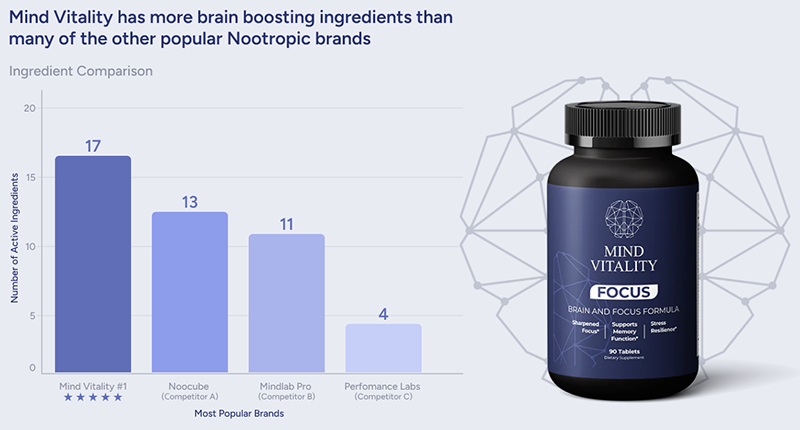
As we age, the prospect of cognitive decline becomes a growing concern for many. Cognitive decline refers to the gradual loss of cognitive functions such as memory, attention, and problem-solving skills. Detecting the early warning signs of cognitive decline is crucial, as timely intervention can help slow down its progression and preserve mental well-being. Here we explore the common early warning signs of cognitive decline, as well as discuss various risk factors and prevention strategies.
Contents
What Is Cognitive Decline?
Cognitive decline refers to the deterioration of cognitive functions over time, affecting an individual’s ability to think, remember, process information, and make decisions. As a natural part of the aging process, some degree of cognitive decline is to be expected. However, the rate and severity of decline can differ significantly among individuals, with some experiencing more pronounced and rapid deterioration.
It’s essential to distinguish between normal age-related cognitive decline and more severe conditions like dementia or Alzheimer’s disease. While cognitive decline might manifest as occasional forgetfulness or taking longer to process information, dementia is a progressive neurological disorder that impairs daily functioning and independence. In this blog post, our focus will be on understanding the early warning signs of cognitive decline and implementing prevention strategies to maintain optimal cognitive health.
Early Warning Signs of Cognitive Decline
Being aware of the early warning signs of cognitive decline can help you identify potential issues in yourself or a loved one, and seek timely intervention. It’s important to note that occasional lapses in memory or cognitive function are normal and can occur at any age. However, persistent or worsening issues may indicate a more significant problem.
Memory Loss
Memory loss is one of the most noticeable and concerning early warning signs of cognitive decline [1]. While occasional forgetfulness is a normal part of aging, persistent and worsening memory issues may indicate a more significant problem.
- Misplacing items: Regularly losing or misplacing belongings, such as keys or eyeglasses, and being unable to retrace steps to find them.
- Forgetting important dates or events: Consistently failing to remember significant occasions, such as birthdays, anniversaries, or appointments.
- Repeatedly asking for the same information: Frequently requesting the same details or clarification multiple times, even after receiving the information.
Difficulty with Problem-solving
Difficulty with problem-solving is another early warning sign of cognitive decline that can significantly impact an individual’s daily life [2]. While occasional lapses in problem-solving skills can happen to anyone, consistent struggles with familiar tasks may warrant further investigation.
- Struggling with familiar tasks: Experiencing trouble with tasks that were once routine, such as preparing a meal, using household appliances, or managing personal finances.
- Difficulty planning or organizing: Finding it challenging to coordinate events, make plans, or manage daily responsibilities effectively.
- Impaired decision-making: Exhibiting poor judgment or difficulty making decisions, even when faced with relatively simple choices.
Difficulty with Language and Communication
Difficulty with language and communication can be a subtle but impactful early warning sign of cognitive decline [3]. When cognitive functions begin to deteriorate, individuals may find it increasingly challenging to express themselves or engage in conversations.
- Struggling to find the right words: Frequently having trouble recalling the appropriate words to express oneself or describe objects.
- Repeating phrases or stories: Telling the same story or information multiple times, seemingly unaware of the repetition.
- Difficulty following or joining conversations: Struggling to keep up with or engage in conversations, often leading to withdrawal from social situations.
Changes in Mood and Personality
Changes in mood and personality can also serve as early warning signs of cognitive decline [4]. As cognitive functions decline, individuals may experience emotional fluctuations and alterations in behavior that deviate from their typical patterns.
- Increased irritability or aggression: Becoming easily frustrated, agitated, or confrontational, even in response to minor issues.
- Social withdrawal or apathy: Exhibiting a lack of interest in social activities, hobbies, or interactions that were once enjoyed.
- Uncharacteristic emotional outbursts: Displaying sudden mood swings or emotional reactions that seem disproportionate to the situation.

Risk Factors for Cognitive Decline
Understanding the risk factors associated with cognitive decline can help you make informed decisions about your lifestyle and health to minimize the chances of developing cognitive issues. While some risk factors cannot be controlled, such as age and genetics, there are many lifestyle factors and medical conditions that can be managed to support optimal brain health.
Age
The risk of cognitive decline increases as we age. While it’s essential to note that cognitive decline is not inevitable, the natural aging process does make it more likely, especially as we move into our later years.
Genetics
Genetic factors, including a family history of cognitive decline, dementia, or Alzheimer’s disease, can increase an individual’s risk. While you can’t change your genes, being aware of your family history can help you make informed decisions about your lifestyle and healthcare.
Lifestyle factors
Unhealthy lifestyle choices can contribute to cognitive decline, making it crucial to adopt habits that support brain health.
- Lack of physical activity: A sedentary lifestyle can increase the risk of cognitive decline, as physical activity is essential for maintaining healthy blood flow to the brain and promoting the growth of new brain cells.
- Poor diet: Diets high in unhealthy fats, sugars, and processed foods can contribute to cognitive decline by negatively affecting brain function and overall health.
- Chronic stress: Prolonged stress can have detrimental effects on brain health and cognitive function, making stress management an essential part of maintaining cognitive well-being.
- Sleep deprivation: Consistently getting insufficient sleep can impair cognitive function and increase the risk of cognitive decline.
Medical Conditions
Certain medical conditions can also increase the risk of cognitive decline:
- Diabetes: Poorly managed diabetes can lead to cognitive decline by causing damage to blood vessels in the brain, reducing blood flow, and increasing inflammation [5].
- High blood pressure: Uncontrolled high blood pressure can cause damage to the blood vessels in the brain, contributing to cognitive decline [6].
- Depression: Studies have found that individuals with depression may be at a higher risk for cognitive decline, making it essential to address mental health issues as part of a comprehensive approach to cognitive health.

Strategies for Preventing Cognitive Decline
Adopting a proactive approach to cognitive health can help reduce the risk of cognitive decline and support optimal brain function throughout the aging process.
Physical Activity
Regular exercise is essential for maintaining cognitive health, as it helps promote healthy blood flow to the brain, reduce inflammation, and support the growth of new brain cells.
- Recommended exercise guidelines: Aim for at least 150 minutes of moderate-intensity aerobic activity or 75 minutes of vigorous-intensity aerobic activity per week, along with muscle-strengthening exercises on two or more days per week.
- Benefits for brain health: Exercise has been shown to improve cognitive function, reduce the risk of cognitive decline, and support overall brain health.
Mental Stimulation
Engaging in mentally stimulating activities can help keep the brain sharp and reduce the risk of cognitive decline [7].
- Cognitive training and brain games: Participate in activities that challenge your brain, such as puzzles, strategy games, or learning new skills.
- Lifelong learning and continuing education: Pursue new educational opportunities, attend lectures, or take courses to expand your knowledge and keep your mind engaged.
Social Engagement
Staying socially connected is essential for maintaining cognitive health, as it helps reduce stress, increase mental stimulation, and promote overall well-being.
- Importance of social connections: Research has shown that individuals with strong social connections have a lower risk of cognitive decline and better cognitive function.
- Suggested social activities: Engage in group activities, join clubs, volunteer, or maintain regular contact with friends and family to stay socially connected.
Healthy Diet
A balanced, nutrient-rich diet can support brain health and help prevent cognitive decline.
- Nutrient-rich foods for brain health: Consume a diet rich in fruits, vegetables, whole grains, lean protein, and healthy fats, such as the Mediterranean or DASH diet.
- Recommendations for a balanced diet: Focus on consuming a variety of nutrient-dense foods, staying hydrated, and limiting processed foods, sugar, and unhealthy fats.
Stress Management
Managing stress is crucial for maintaining cognitive health, as chronic stress can negatively impact brain function and increase the risk of cognitive decline.
- Mindfulness and relaxation techniques: Incorporate practices such as meditation, yoga, or deep breathing exercises into your daily routine to help manage stress.
- Importance of work-life balance: Establish boundaries between work and personal life to reduce stress and promote overall well-being.
Sleep Hygiene
Prioritizing quality sleep is essential for supporting cognitive health, as it allows the brain to rest, repair, and consolidate memories.
- Recommended sleep guidelines: Aim for 7-9 hours of sleep per night for optimal cognitive function.
- Tips for improving sleep quality: Establish a regular sleep schedule, create a relaxing bedtime routine, and maintain a sleep-conducive environment to promote restful sleep.

Consult a Healthcare Professional
If you or a loved one experiences persistent early warning signs of cognitive decline, it’s crucial to consult a healthcare professional for a thorough evaluation. Timely intervention can help slow the progression of cognitive decline and improve the individual’s quality of life. Below are some key reasons to seek the help of a healthcare professional.
Proper Diagnosis
Consulting a healthcare professional ensures that the symptoms are accurately assessed, and the correct diagnosis is made. Cognitive decline can sometimes be mistaken for other conditions, such as depression or vitamin deficiencies, which require different treatment approaches.
Early Intervention
Early intervention is crucial for managing cognitive decline, as it can help slow its progression, preserve cognitive function, and maintain overall well-being. A healthcare professional can recommend appropriate interventions, which may include cognitive training, medication, or lifestyle changes.
Identifying Underlying Causes
A healthcare professional can help identify any underlying medical conditions that may contribute to cognitive decline, such as high blood pressure, diabetes, or sleep disorders. Addressing these issues can significantly improve cognitive function and overall health.
Personalized Care and Support
A healthcare professional can provide personalized care, guidance, and support to help individuals and their families navigate the challenges associated with cognitive decline. This may include counseling, support groups, or referrals to specialized care providers, such as neurologists or geriatricians.
Monitoring and Adjustments
Regular follow-up appointments with a healthcare professional can help monitor cognitive function and make necessary adjustments to the care plan as needed. This ongoing support can help optimize the effectiveness of the interventions and improve the individual’s quality of life.
Nutritional Supplements That Prevent Cognitive Decline
Mounting evidence is suggesting that there are some nutritional supplements that can prevent, or at least slow, cognitive decline. Some of the supplements that show the most promise in supporting overall brain health are presented here.
Omega-3 Fatty Acids
Omega-3 fatty acids, particularly eicosapentaenoic acid (EPA) and docosahexaenoic acid (DHA), are thought to have several potential benefits in preventing cognitive decline and supporting overall brain health. Here are some ways omega-3 fatty acids may contribute to maintaining cognitive function [8]:
- Anti-inflammatory properties: Omega-3 fatty acids have been shown to reduce inflammation, which is a critical factor in maintaining brain health. Chronic inflammation has been linked to cognitive decline and the development of neurodegenerative diseases like Alzheimer’s.
- Cell membrane health: DHA is a primary structural component of brain cells, specifically the cell membranes. It plays a vital role in maintaining the fluidity and integrity of cell membranes, which in turn helps with efficient communication between neurons.
- Neuroprotection: Omega-3 fatty acids have been shown to protect brain cells from oxidative stress, a process that can lead to damage and deterioration of brain cells over time. This neuroprotective effect may help preserve cognitive function as we age.
- Neurogenesis and synaptogenesis: Some research suggests that omega-3 fatty acids may promote the growth of new brain cells (neurogenesis) and the formation of new connections between brain cells (synaptogenesis). Both of these processes are crucial for maintaining cognitive function.
- Brain-derived neurotrophic factor (BDNF): Omega-3 fatty acids have been shown to increase the levels of BDNF, a protein that supports the survival, growth, and maintenance of neurons. Higher levels of BDNF are associated with better cognitive function and a reduced risk of cognitive decline.
Acetyl-L-carnitine
Acetyl-L-carnitine (ALC) is a naturally occurring compound derived from L-carnitine, an amino acid involved in energy metabolism. It is found in small amounts in certain foods and can also be taken as a nutritional supplement. Acetyl-L-carnitine has been studied for its potential benefits in preventing cognitive decline and supporting overall brain health. Here are some ways ALC might contribute to maintaining cognitive function [9]:
- Energy metabolism: ALC plays a crucial role in transporting fatty acids into the mitochondria, the energy-producing structures in cells. This process is particularly important in brain cells, which have high energy demands. Improved energy metabolism can support optimal brain function and may help prevent cognitive decline.
- Neuroprotection: ALC has antioxidant properties, which can help protect brain cells from oxidative stress, a process that can lead to damage and deterioration of brain cells over time. This neuroprotective effect may help preserve cognitive function as we age.
- Neurotransmitter regulation: ALC has been shown to influence the production and function of various neurotransmitters, such as acetylcholine and dopamine, which are essential for learning, memory, and other cognitive processes. By modulating neurotransmitter levels, ALC may help maintain cognitive function and prevent decline.
- Cell membrane health: ALC may help maintain the fluidity and integrity of cell membranes in the brain, which is essential for efficient communication between neurons.
- Reduced inflammation: Some studies suggest that ALC may have anti-inflammatory properties, which could help protect the brain from chronic inflammation, a factor that has been associated with cognitive decline and neurodegenerative diseases.
Carotenoids
Carotenoids are naturally occurring pigments found in plants, which give fruits and vegetables their vibrant colors. These compounds have antioxidant and anti-inflammatory properties that may contribute to preventing cognitive decline and supporting overall brain health. Here are some ways carotenoids might be beneficial for maintaining cognitive function [10]:
- Antioxidant properties: Carotenoids, such as beta-carotene, lutein, and zeaxanthin, have strong antioxidant properties. They can help protect brain cells from oxidative stress, a process that can lead to damage and deterioration of brain cells over time. This neuroprotective effect may help preserve cognitive function as we age.
- Anti-inflammatory properties: Carotenoids have been shown to reduce inflammation, which is a critical factor in maintaining brain health. Chronic inflammation has been linked to cognitive decline and the development of neurodegenerative diseases like Alzheimer’s.
- Neurogenesis and synaptogenesis: Some research suggests that carotenoids may promote the growth of new brain cells (neurogenesis) and the formation of new connections between brain cells (synaptogenesis). Both of these processes are crucial for maintaining cognitive function.
- Retinal health and visual processing: Lutein and zeaxanthin, in particular, are known to accumulate in the retina and have been associated with improved visual processing and reduced risk of age-related macular degeneration. Visual processing is an essential aspect of cognitive function, and maintaining retinal health may contribute to overall cognitive health.
- Cognitive performance: Some studies have shown that individuals with higher carotenoid levels in their blood or diet have better cognitive performance and a reduced risk of cognitive decline.
Ginkgo Biloba
Ginkgo biloba is an ancient tree species and its extract has been used for centuries in traditional medicine for various health conditions. In recent years, Ginkgo biloba has been studied for its potential benefits in preventing cognitive decline and supporting overall brain health. Here are some ways Ginkgo biloba might contribute to maintaining cognitive function:
- Improved blood flow: Ginkgo biloba has been shown to improve blood flow by dilating blood vessels and reducing blood viscosity. Improved blood flow to the brain can enhance the delivery of oxygen and nutrients, which is crucial for optimal brain function.
- Antioxidant properties: Ginkgo biloba extract contains powerful antioxidants, including flavonoids and terpenoids, which help protect brain cells from oxidative stress. This neuroprotective effect may help preserve cognitive function as we age.
- Reduced inflammation: Some studies suggest that Ginkgo biloba has anti-inflammatory properties, which could help protect the brain from chronic inflammation, a factor that has been associated with cognitive decline and neurodegenerative diseases.
- Neurotransmitter regulation: Ginkgo biloba has been shown to influence the production and function of various neurotransmitters, such as serotonin, dopamine, and norepinephrine, which are essential for cognitive processes like learning, memory, and attention.
- Neuroprotection: Some research indicates that Ginkgo biloba may have neuroprotective effects, helping to prevent cell damage and death in the brain.
References
[1] 10 Early Signs and Symptoms of Alzheimer’s
[2] Dementia Symptoms, Types, and Causes
[3] Declines in Connected Language Are Associated with Very Early Mild Cognitive Impairment
[4] Personality Change May Be Early Sign of Dementia, Experts Say
[5] The Effects of Diabetes on the Brain
[6] Cognitive Reserve: Building a Buffer Against Age-Related Brain Decline
[7] Protecting against cognitive decline
[8] Study links omega-3s to improved brain structure, cognition at midlife
[9] Clinical and neurochemical effects of acetyl-L-carnitine in Alzheimer’s disease
[10] A promising and simple way to maintain brain health in women

